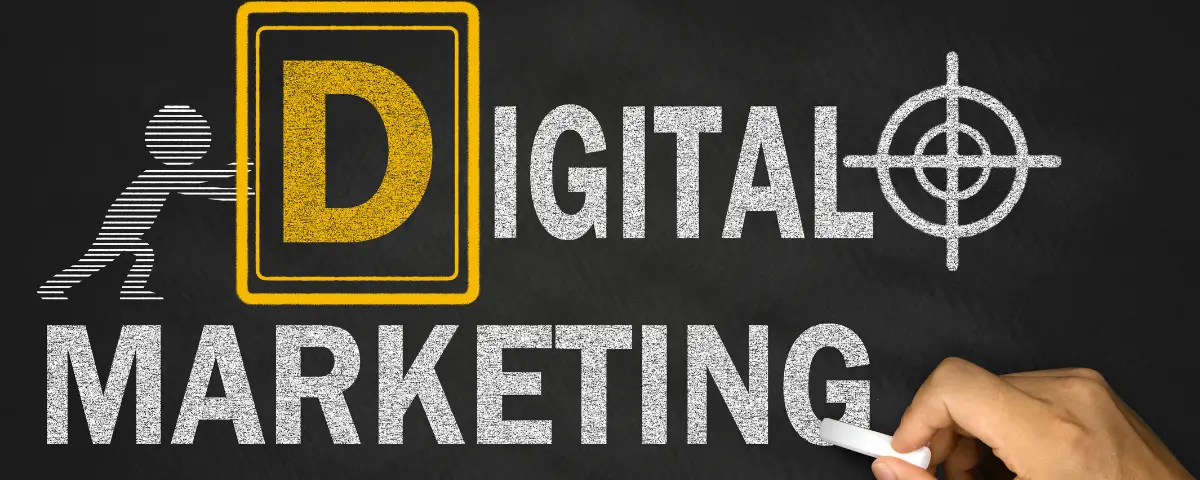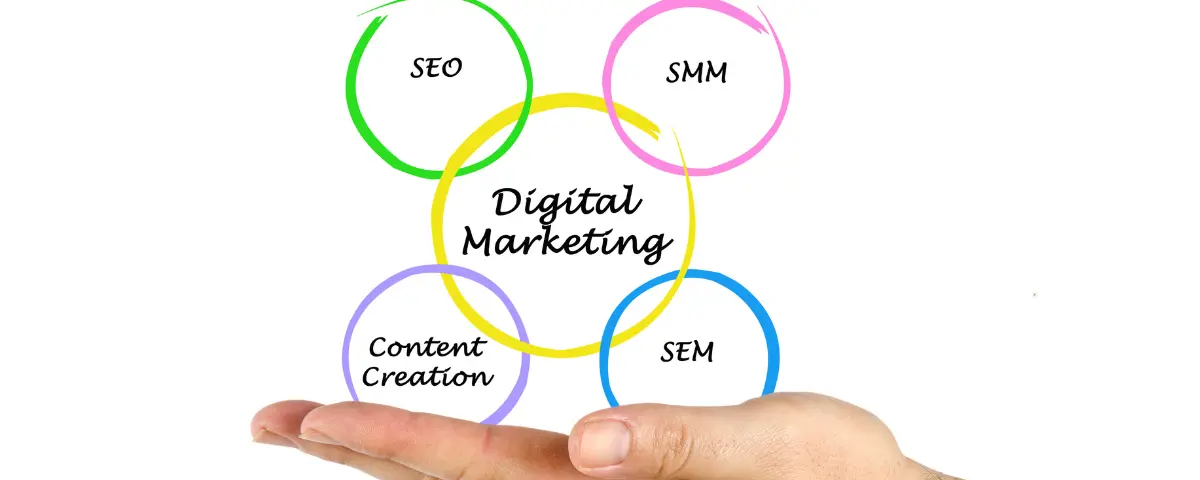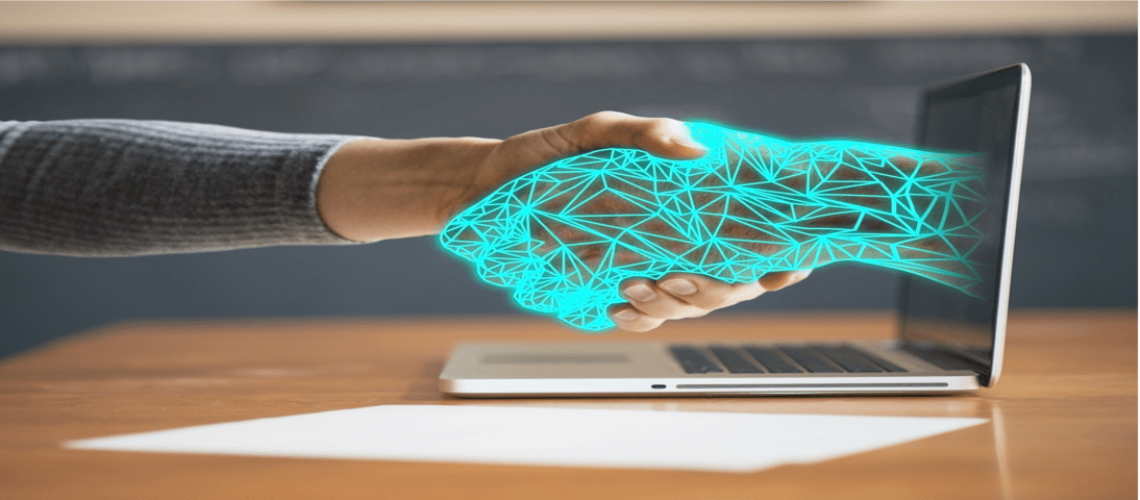The use of AI in digital marketing as a tool for demand forecasting, customer support, blog post writing, and other tasks has drastically changed the landscape of digital marketing.
Are you trying to figure out how to step up your digital marketing strategy? Artificial intelligence (AI) has the potential to be the ideal tool for improving ROI, personalizing marketing campaigns, and content optimization.
We’ll go over all you need to know about using AI in digital marketing in this blog post.
Why then wait? Let’s explore the realm of artificial intelligence!
What is AI in digital marketing?

AI in digital marketing is used to automate marketing processes, choices and obtain customer insights through the use of AI tools like data collection, machine learning, natural language processing, and data analysis.
The benefit of it is that it can quickly provide you with insights into consumer behaviour by gathering enormous data.
Depending on a customer’s behavior and preferences, these can be utilized to respond to and customize their demands. With time, AI can also adjust, and get better thanks to user input and fresh data.
However, AI does not take the place of human jobs and labor! While it is a technology that enhances and complements those, its proper usage requires human talent.
Benefits of AI in digital marketing
AI allows digital marketer to enhance their marketing efforts in several ways, thanks to its possible applications. These benefits include:
1. Predicting customer behavior
Trying to reach every individual who fits into your company’s specialization will take a significant amount of time, money, and energy.
Get 50% Discount to Master ALL Aspects of Digital Marketing That Can Earn You $2,500 - $5,000 a month (Even if you are a complete beginner!)
Our students that intentionally implement what they learn from our digital marketing course make back the entire course fee within a single month or more after completing our course because our course gives them many income generating options with unlimited earning potential with no age or location barrier. The best part is no technical skills are required.
An opportunity to change your lifestyle and make money working from anywhere in the world. The results our students get from our digital marketing course prove this could be applied to any market or country and that it is designed for any skill level and work background.
*By signing up, you agree to our privacy policy and terms of service.
Thankfully, you can use AI algorithms to sort through an otherwise dispersed audience and find the prospects who are most likely to take action on your offer.
AI and machine learning models can be used to study customer behavior, spot trends, and create digital marketing plans based on those findings.
Additionally, it is used to build these models around the goals you want to accomplish with your marketing initiatives, like higher website traffic, lead generation, or conversion rates.
2. Better Analysis of Customer Engagement
Due to the fact that client acquisition costs are significantly higher than customer retention costs, measuring customer engagements is essential for identifying what worked and what didn’t.
AI tools can offer insights that will help you generate more consistent revenue, By comparing past and present customers.
Also, you may enhance their experience, and more effectively target their past clients. AI also provides useful data about the preferences of each client, and how to best target them.
AI can be used to better engage your audience by tracking their activity, and analyze live consumer conversations, to find out why people are talking about certain topics on various social media networks. By using activities that work for each audience, you will be able to target clients more effectively.
3. Using Ads to Target Specific Audiences
Persuading potential customers is an essential part of targeted marketing, but as any marketing expert will tell you, it can be difficult to persuade strangers.
Fortunately, you can use AI in conjunction with intelligent design for individualized customer experiences, virtual assistants, or predictive consumer segmentation to get there.
Additionally, compared to marketing that targets consumers based on their broad inclinations, traditional advertising has become far less effective.
As AI becomes more prevalent, marketing experts may be able to anticipate customers’ inclination to buy before requesting payment in cash, or via credit by using customized data.
4. Marketing can now be Automated
AI can also assist you in automating digital marketing while maintaining audience targeting. The perfect combination for producing a high degree of marketing personalization is automation, and personalization via artificial intelligence.
Also, your firm might acquire an edge in attracting customers, which is something that all businesses require in a market that is expanding quickly. Search engine marketing (SEM), pay-per-click (PPC) ads, conversion rates, SEO, social media marketing (SMM), and keyword research can all be automated with AI systems.
5. Fostering Good Customer Relationship
Artificial Intelligence (AI) is essential to customer relationship management since businesses can now obtain real-time insights into how their consumers interact via multiple communication platforms.
AI is able to employ statistical models to identify the best course of action, after automatically assigning concerns to the relevant support group.
To determine which visitors are most likely to stick around, you may keep an eye on the user data on your website. In addition, You can determine what promotions you may utilize, to maintain their brand loyalty by looking at their preferences.
How to Use AI in Digital Marketing

1. Content Creation
Since the inception of content marketing, content production has consistently been identified by marketers, as one of their major issues. It takes time to produce high-quality content, and lots of it is needed for successful marketing.
AI can assist by producing a certain amount of content on the marketer’s behalf. The material can be more focused, like email subject lines and social media adverts written in a language generated by AI, or it can be sections with hundreds of words, that read as though they were written by an actual human being.
Regardless of the situation, the material produced is centered on the needs of the client, which is meant to be helpful, without needing many hours from an employee, or freelancer to produce for a customer who is looking for information. (Read more about our article on content creation).
2. Email Marketing
This should be a key component of every marketing plan since email marketing is still a powerful tool for engaging customers and converting prospects. By utilizing AI technologies, you may increase efficiency, and save time with your email marketing.
AI in emails allows you to do the following:
- Examine email performance, to find ways to improve your email tactics (such as using effective subject lines).
- Construct workflows that are triggered by user input.
- Analyze campaigns and workflows.
- Write content with your audience in mind.
- Customize material for certain audience groups.
- Turn on dynamic content
- Do A/B testing.
AI may also curate your email lists, by comparing metrics to ascertain the worth of an email address, or email list. (you can read more on email marketing).
3. Customer Support
Artificial intelligence (AI)-powered chatbots have long been used as a means of customer communication, and information delivery. People first turn to chatbots when they want to engage with a company or obtain quick answers to basic questions.
However, AI is more significant when it comes to customers. It can enhance the customer experience by anticipating consumer wants, expediting the purchasing process, personalizing content, messaging, and directing questions.
4. SEO
It is one field in which artificial intelligence has enormous potential. In order to rank online sites, search engines like Google have been using complex algorithms that crawl, and index the pages.
Through Search Generative Experience (SGE), AI is now being further integrated with that process, drastically altering the search landscape.
In addition to producing Meta tags and headings, AI can analyze user behaviour to automate, enhance keyword research, and content optimization.
Marketers may also utilize it to forecast user behaviour, algorithm changes, and SEO trends, through predictive SEO.
Information may be found more effectively via voice, and visual search, both of which AI can enhance. To do this, concentrate on natural language processing (NLP), long-tail keywords, and make sure that your photos have pertinent information.
5. Marketing Automation
Automating email, social media, and data analysis duties is possible with marketing automation systems that are powered by AI. It helps companies to concentrate on innovative, and strategic projects that will increase efficiency, performance, and sales in marketing.
Marketing automation systems driven by artificial intelligence (AI) can yield several advantages for digital marketing initiatives.
- AI algorithms can tailor marketing content with the use of user data and behavior.
- AI predictive analytics systems determine whether users are likely to convert, or perform a particular action by analyzing user data, and applying machine learning.
- Digital marketing campaigns can be instantly optimized using AI campaign optimization technologies, based on user feedback and behavior.
- Businesses may prioritize their follow-up, and concentrate their resources on the most promising leads, by using AI lead scoring algorithms.
- AI algorithms are able to offer insights into the preferences, interests, and activities of customers, through the analysis of customer data and behavior. Businesses can use this data to better focus their advertising, and understand their target audience.
6. Data Analysis
Marketers frequently experience confusion and this is due to the huge amount of data available, from a multitude of platforms.
On the other hand, large amounts of data can be processed quickly, by artificial intelligence. In addition to using past data to forecast patterns and behaviours, this can assist marketers in deriving insights from data.
AI is also capable of finding patterns and identifying abnormalities in data.
when using its Advanced Data Analysis plugin, excellent data analysis features are offered by ChatGPT. It allows you to feed a spreadsheet to ChatGPT, which in turn lets you find deeper insights beyond the spreadsheet’s contents.
You can acquire and hone relevant digital marketing skills by enrolling in some or all of the courses listed to get started.
How do organizations make use of AI in digital marketing?
1. AI in CRM
Customer relationship management is a skill that every marketer should possess, given that returning customers are frequently a company’s biggest source of income.
Here, AI can be used to lower the chance of “churn”, which is the loss of customers, by recognizing patterns of behavior that are likely to drive them away.
AI-driven CRM will also enable companies to predict sales more precisely in every market in which they operate, resulting in a more effective allocation of resources, and stock.
It may also be used to discover customer records that have errors or duplicates that are likely to exist, therefore preserving the quality of data in the CRM system.
2. AI in Digital Advertising
Digital advertising is unquestionably one of the fields where AI research is most successfully implemented. Big corporations like Facebook and Google employ artificial intelligence in their advertising networks, to give users the best possible experience.
It evaluates user data, including location, interests, gender, and age, and displays its advertisements to individuals or groups to whom the company is relevant. As a result, the advertising return on investment (ROI) is increased.
Another illustration of the use of AI in digital advertising efforts is Coca-Cola. The company creates logos, copy, and storylines for advertisements automatically using artificial intelligence.
The number of AI-driven marketing campaigns is rising along with the interest and application of AI. Brands release the details of its next AI-generated digital marketing campaign every other day.
When implemented appropriately, artificial intelligence has countless advantages for digital advertising. Artificial intelligence’s assistance for advertising campaigns increases the effectiveness of marketers’ work and yields high campaign conversion rates.
3. AI in Marketing Visual Creation
Artificial intelligence has advanced significantly over the last ten years. By analyzing and interpreting visual data, AI algorithms play a critical role in the development of visual content by enabling machines to detect objects, edit films, and create graphics.
These algorithms can recognize patterns, objects, and emotions in photos, and videos by using machine learning, and computer vision techniques.
AI has completely changed the visual content creation industry by streamlining workflows and automating tedious operations.
AI gives creatives the tools they need to explore new ideas and improve their work by producing realistic graphics, enhancing the quality of images and videos, and providing insightful data for content optimization.
It’s crucial to remember that AI is seen as a potent tool, that enhances and supplements human creativity, not as a substitute for it.
4. AI in Chatbots Application
The advancements in semantic definition, including language processing by artificial intelligence and subject matching, have made chatbot applications more advantageous in terms of enhancing customer experience, and customer services.
For instance, chatbots can handle multiple consumers at once but customer service agents, only deal with one client at a time.
Another benefit that AI can offer is fast and smooth 24/7 support. Consequently, you may maintain constant contact with your clients. It keeps you one step ahead of competitors who don’t offer the same service.
Additionally, if your business operates internationally, you can stay in constant touch with your clients because of the various language options available, which also allow you to maintain time zone differences.
5. AI in SEO
Marketers now rely more on artificial intelligence (AI) to help them adjust to search engines’ algorithms. Numerous requirements are covered by SEO, both technically and semantically.
Artificial intelligence in SEO raises your website’s rating and makes it possible for you to create better content, and more flexible marketing tactics for your company.
According to a HubSpot study, more than half of marketers stated that the main methods they assess the effectiveness of their SEO initiatives are through keyword rankings and organic traffic.
Many businesses concentrated on utilizing AI to improve their SEO strategies in light of the recent buzz surrounding artificial intelligence.
6. AI in Content Marketing
Content-based marketing has taken the lead in many industries due to the growth of social media marketing, and our increasing demand for online content.
Going one step further, artificial intelligence is becoming capable of handling the entire content creation process, by producing visuals, and copies that it knows will appeal to its target audience. Personalization is going to be a big phase in this industry.
It refers to the process of serving content that is uniquely tailored to each individual client, possibly using data, and points of reference that the AI has determined are pertinent to them, and woven into the main marketing messages.
7. AI and User Experience (UX)
For optimal outcomes, a well-established UX needs human intervention. Artificial intelligence does not appear to be prepared to replace people, even though it is already able to solve specific optimization issues for certain types of material.
AI for UX design will continue to blend creative thinking, and human intellect with the useful solutions found in the virtual world. By streamlining the technical process, this emerging profession can aid in the creation of new concepts.
Furthermore, user experience algorithms which track our every move, keep learning from user motions in real time. They monitor the content we use and the amount of time we spend with it. They have such a close relationship with us that they can infer our potential desires.
These services become unique products, for every user when user data is integrated with artificial intelligence. Consequently, they provide every participant a distinct experience.
How to Use and Leverage AI in Marketing Campaigns
To the majority, artificial intelligence in marketing may appear like an extra tool for their regular business-related duties. AI becomes the cornerstone of digital marketing strategy for a selected few.
You can apply AI in your digital marketing campaigns in the following ways:
- Social media marketing
- Content creation and optimization
- Chatbots and virtual assistants
- Predictive analytics
- AI-enhanced PPC advertising
1. Social Media Marketing
Content creation, data analysis, and social media marketing are all possible with artificial intelligence. Additionally, you can use it to identify client behavior, preferences, and trends. This information can help you target the correct audience, optimize posts and ads, and develop social media campaigns that are more successful.
2. Content Creation and Optimization
Marketers may expedite the design and optimization process by utilizing AI marketing technologies. With the aid of these machine learning techniques, they may improve readability and engagement by coming up with ideas, proofreading and spelling, suggesting keywords, and making recommendations.
On the other hand, some AI programs can write reports, articles, social media postings, and more depending on a given topic or brief. Marketer’s content marketing efforts can be greatly improved, and expedited by utilizing past data by putting AI-powered tools into place.
3. Chatbots and Virtual assistants
Artificial intelligence (AI)-powered chatbots, and virtual assistants provide clients with real-time support by responding to inquiries and helping with the buying process.
These machine learning solutions are compatible with websites, social media networks, and messaging apps with ease. Customer service and user experience will eventually receive a much-needed boost. Virtual assistants can tailor the consumer experience by looking at previous purchases.
4. Predictive Analytics
Using statistical algorithms, consumer insights, and machine learning approaches to estimate the probability of future outcomes, based on past data is known as leveraging predictive analytics in a company’s digital marketing strategy.
They can use predictive analytics with marketing AI systems to find patterns and trends that will affect their marketing campaigns.
AI platforms can be used, for example, to predict client behavior, such as which goods or services a customer is likely to purchase, or which ones they would discontinue using.
Utilizing this consumer data can help create a targeted marketing campaign, increase revenue, and improve client retention.
5. AI-Enhanced PPC Advertising
AI is a useful tool for improving Pay-Per-Click (PPC) advertising campaigns because it can instantly modify ad text, bids, and targeting based on its ability to analyze vast volumes of data.
In order to increase conversion rates and save expenses, AI marketing solutions may also determine the most efficient keywords, optimize bidding tactics, and enhance ad targeting.
Additionally, organizations may use marketing AI to build, and test ads in order to assist them create more effective ad language, and creativity that appeals to their target audience.
Challenges and concerns of AI in digital marketing
AI could revolutionize Digital marketing, but its use will require caution, especially when it comes to privacy. To maintain user trust, transparent data processing that complies with international privacy standards is vital.
AI streamlines procedures, yet human characteristics like empathy, intuition, and discernment never go away. Specifically, biases present in human data may unintentionally influence AI results. Maintaining moral, effective marketing strategies needs both human monitoring and periodic audits.
Thus, the crucial question is, How can marketers use AI while maintaining a genuine human touch? The marketing innovators of the future will surely combine technology and real human interaction in a seamless way.
What is the future of AI in marketing
Artificial intelligence (AI) is undoubtedly gaining popularity in today’s industry, and its applications and advantages in digital marketing are growing daily. Everyone agrees that we are only beginning to scratch the surface, even if many recognize the present advancements.
It now plays a bigger part in marketing than just automation. It dives into complex consumer interactions, strategic planning, and data analytics. Its significant effects are already being felt, but we are only getting started.
Many experts believe that when AI can think, evaluate, and adapt with a depth that mimics human intuition and foresight, that’s when its full prowess will be revealed.
Imagine marketing systems that are able to truly understand the emotions, preferences, and subtle triggers of their customers in addition to sorting through enormous databases!
As this technology develops, we’ll probably see an unparalleled fusion of human creativity and AI precision that will completely change the marketing landscape.
Conclusion
Artificial intelligence is making waves In the field of marketing. If you want to stay ahead of the game, it’s important to monitor new trends, and continuously test out new AI solutions as they become accessible.
AI has become a potent tool to assist firms obtain a competitive edge, as digital marketing continues to change to keep up with global developments.
You may gain important insights, streamline procedures, and expand your company to new heights in lead conversion, and revenue by integrating AI into your digital marketing operations.
Also, you may enhance productivity, return on investment, and customer experiences by implementing AI into your marketing strategies in ways that are appropriate for your company.
There’s no disputing AI’s many advantages, whether you’re utilizing it to create lead generation chatbots, stop customer loss, or improve the efficiency of your content development process.
FAQs
What are the free AI tools for digital marketing?
- Jasper AI for writing copy
- Lexica Art (for thumbnails on blogs)
- Surfer SEO (for writing SEO content)
- Notion AI (for productivity)
- Zapier (for work automation)
- The Hemingway app (for editing content)
- Use Chatfuel for chatbots.
- Grammarly (to edit content)
- For digital advertising, use Albert.ai
- (For landing pages) Headlime
- Conversation management use Userbot.ai
- PhotoRoom (for background removal from images)
- The AI Sales Email Assistant from Reply.io (for email replies)
- Brand24 (to track media coverage)
What is an AI marketing strategy?
AI marketing is the process of delivering customer insights and automating crucial marketing decisions through the use of AI capabilities such as data collecting, data-driven analysis, natural language processing (NLP), and machine learning (ML).
Is AI going to replace digital marketing?
Marketing roles won’t be entirely replaced by AI anytime soon. For the time being, digital marketers can breathe. This is mostly because AI is still unable to entirely replace elements like human creativity, emotional intelligence, and ethical considerations.
However, AI is not a threat; rather, it is the present and the future. It will only be useful for routine operations and assist digital marketers in improving marketing.
More Resources
Will AI replace Digital Marketers?
Email Marketing 101: Everything You Need To Get Started
Digital Marketing Internship: Top 7 Digital Marketing Internship Websites






